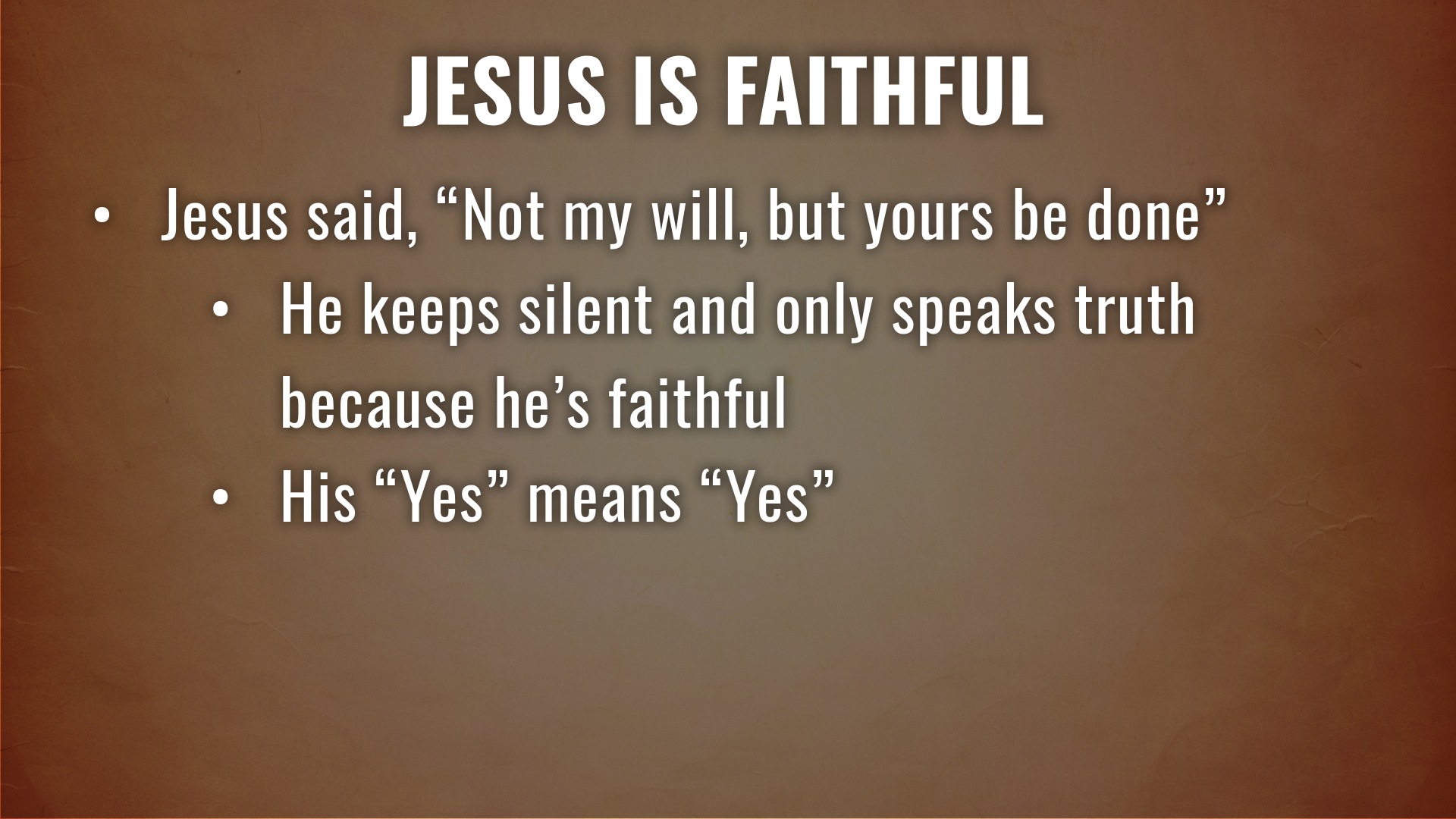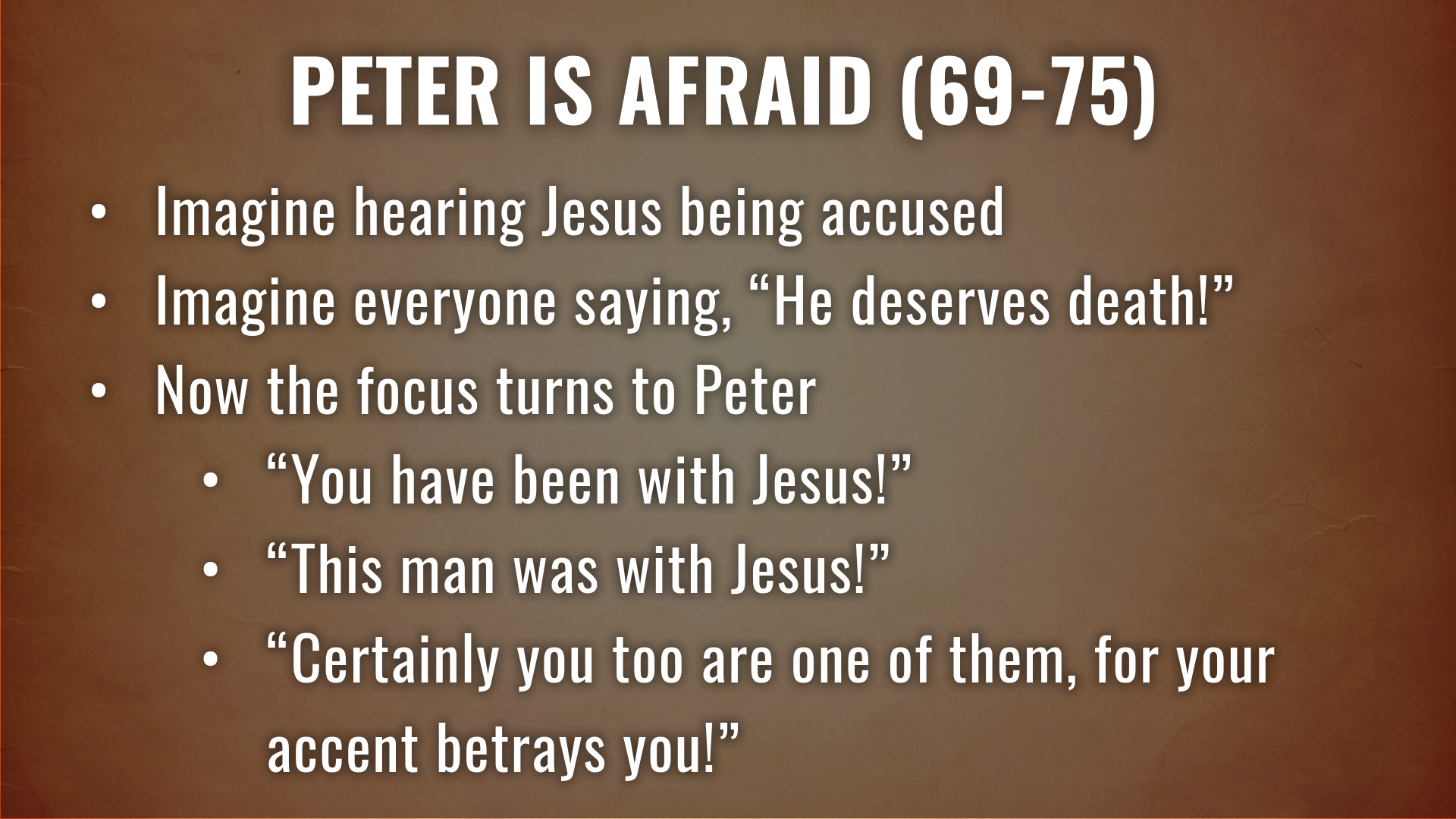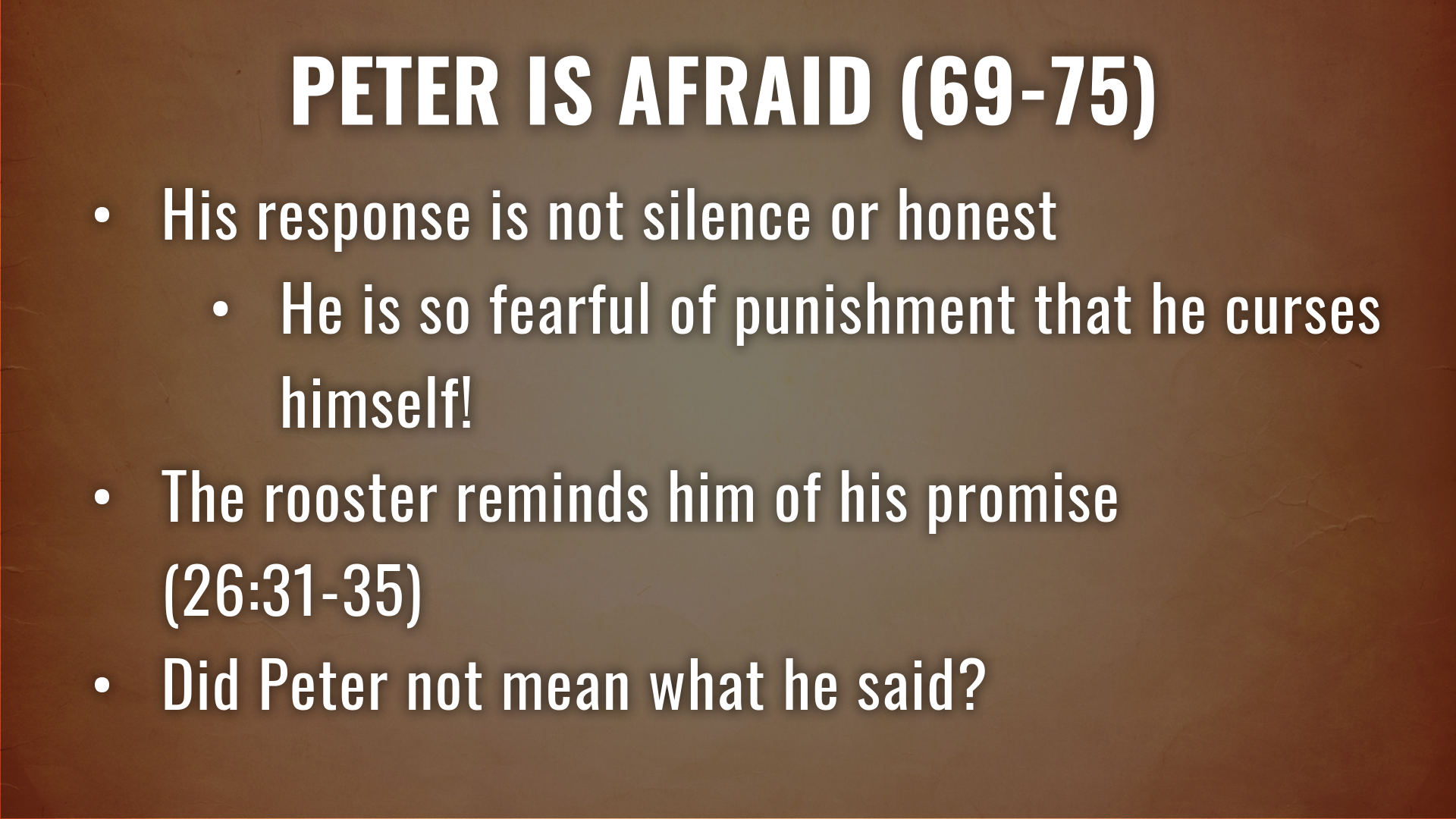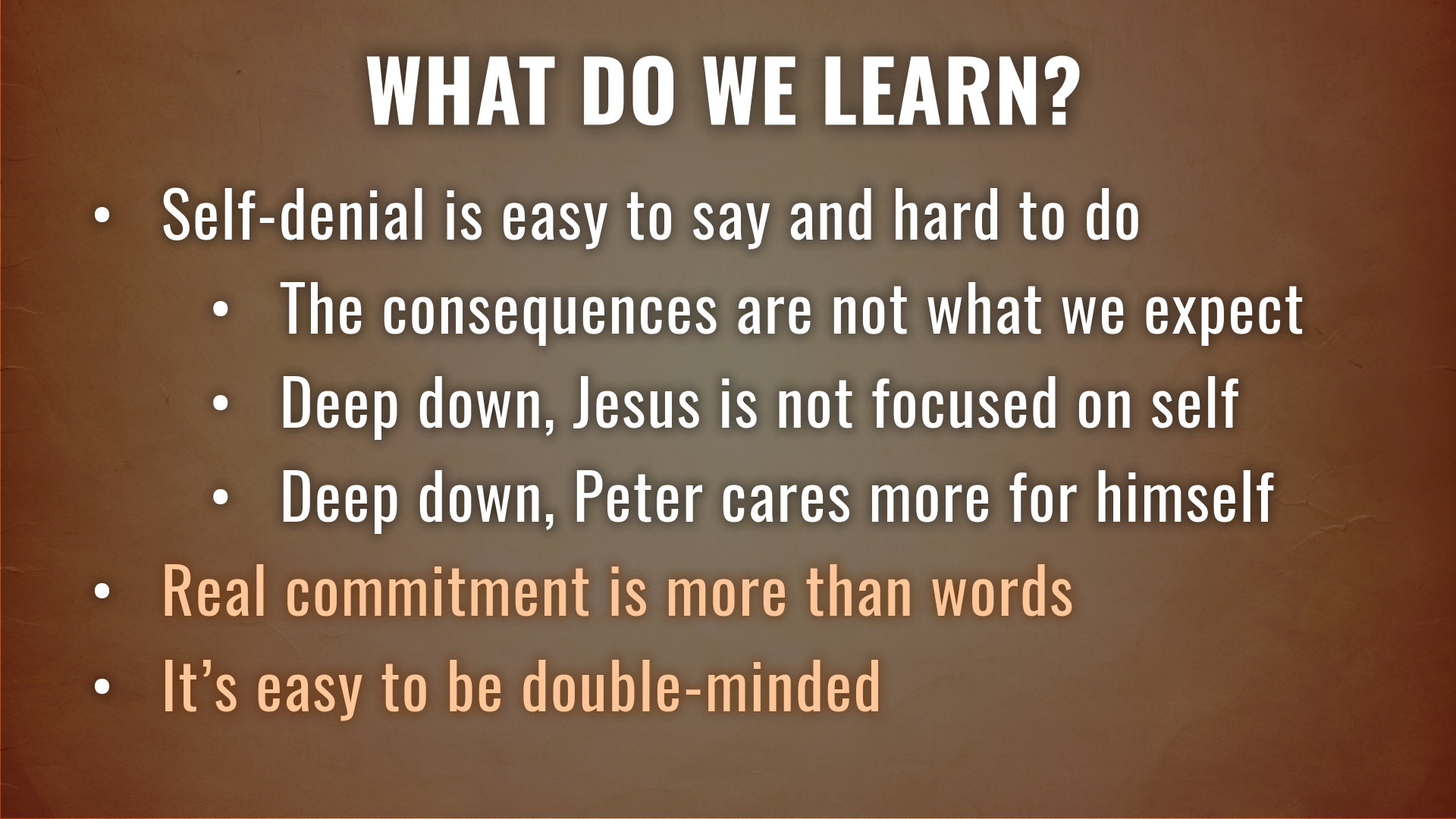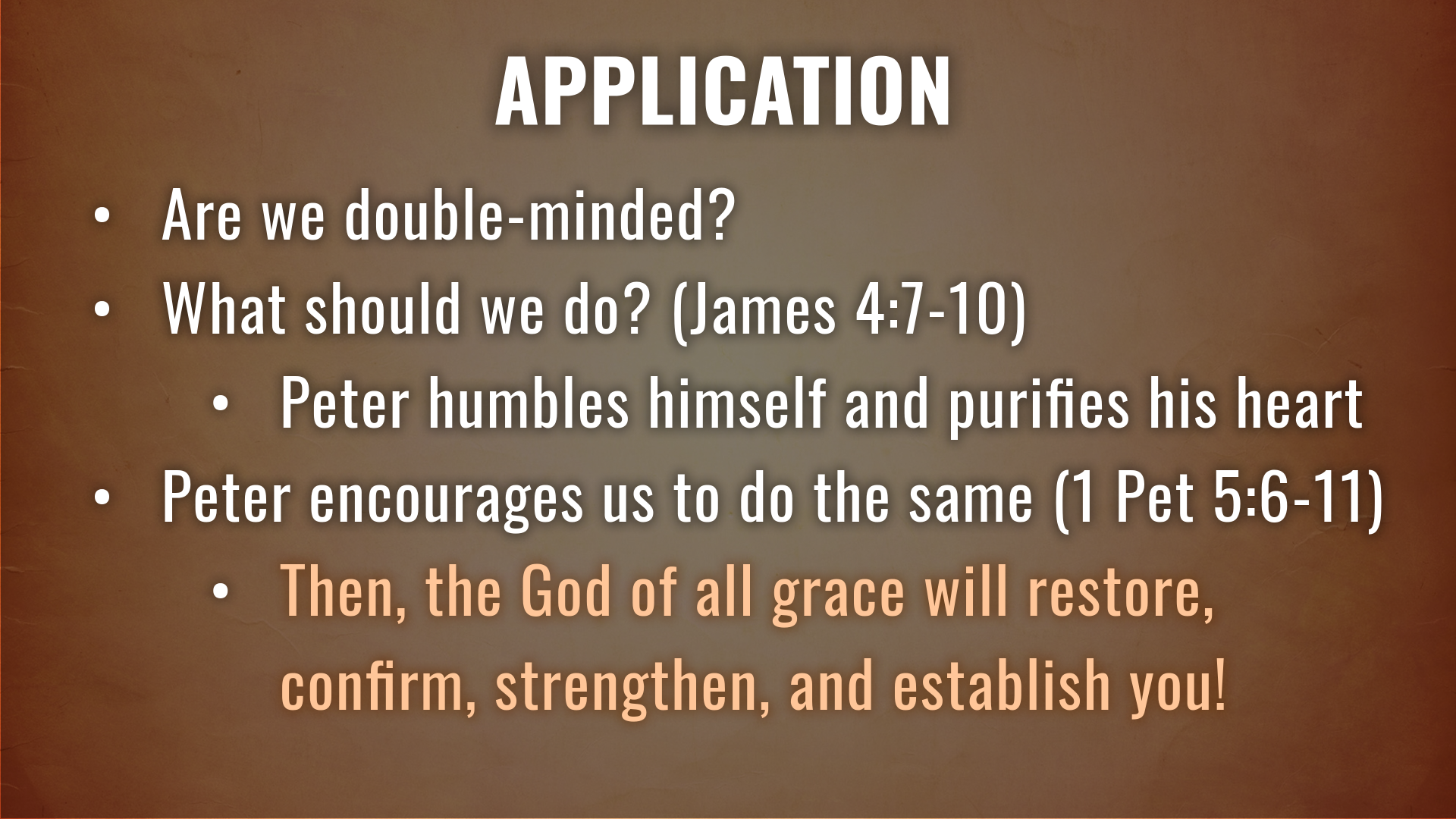Weeping Bitterly (Matthew 26:69-75)
Have you ever made a promise that you struggled to keep? Maybe you said you would do something, but plans changed, and now it’s not in your best interest to do what you promised. Have you ever made a vow to God without considering how hard it would be to keep that vow? Today, I want us to start by thinking about the promises that we have made to God.
Jesus is Faithful
In the last section, we read about Jesus following through with his promise. He said to God in prayer, “Not my will, but your will be done.” That’s not really a promise. It’s more like a statement. But since that moment, he has been arrested, and he does not put up a fight. He could fight and dominate those against him, but instead, he lets them arrest him. Then, he lets them accuse him of all kinds of things he has never done. He doesn’t argue with them. He stays silent.
These men have mistreated Jesus, but he remained silent and submitted to them. When they press on him to speak, he speaks only the truth. Then, he lets them use his words against him while remaining silent. We see Jesus completely submitting to whatever God wants to happen to him, just as he had promised.
How would we respond in that situation?
Peter’s Trial
Last week, when we read the beginning of this story, we learned that Peter was following Jesus. He was in the courtyard listening in to the proceedings. Imagine hearing all of this unfair treatment of your mentor going on from just outside. Imagine everyone saying, “He deserves death!”
Matthew 26:69--75 (ESV) --- 69 Now Peter was sitting outside in the courtyard. And a servant girl came up to him and said, “You also were with Jesus the Galilean.” 70 But he denied it before them all, saying, “I do not know what you mean.” 71 And when he went out to the entrance, another servant girl saw him, and she said to the bystanders, “This man was with Jesus of Nazareth.” 72 And again he denied it with an oath: “I do not know the man.” 73 After a little while the bystanders came up and said to Peter, “Certainly you too are one of them, for your accent betrays you.” 74 Then he began to invoke a curse on himself and to swear, “I do not know the man.” And immediately the rooster crowed. 75 And Peter remembered the saying of Jesus, “Before the rooster crows, you will deny me three times.” And he went out and wept bitterly.
Notice that Peter faces three accusations. First, one servant of the high priest says, “You have been with Jesus.” Usually, that would be something to be proud of, but an association with Jesus could mean serious trouble right now. He denies it, saying, “I don’t know what you mean?” It’s a subtle lie. It’s just acting confused and disoriented. It is late in the night. Maybe Peter didn’t know what she meant by saying that. But it is more likely that he knew what she meant, and he did not want to be associated with Jesus right now.
Then, another servant girl says the same thing. This time she tells some bystanders that Peter was with Jesus, and he point blank says, “I do not know the man.” At this point, he fully denies knowing Jesus. He senses the danger, so he takes an oath. He promises that he does not know Jesus.
The third time, the bystanders approach Peter and say that his accent betrays him. He is caught. There are many of them, and he will likely be arrested too. This time, he invokes a curse on himself while swearing that he doesn’t know Jesus. We see that Peter is so fearful of the punishment that might come by being a disciple of Jesus that he curses himself.
Then, the rooster crows. This reminds Peter of his promise. Peter had sworn that he would never fall away. He made a promise, but now he is making the exact opposite promise. Jesus predicted that Peter would have already denied Jesus three times before the rooster crowed.
Matthew 26:31--35 (ESV) --- 31 Then Jesus said to them, “You will all fall away because of me this night. For it is written, ‘I will strike the shepherd, and the sheep of the flock will be scattered.’ 32 But after I am raised up, I will go before you to Galilee.” 33 Peter answered him, “Though they all fall away because of you, I will never fall away.” 34 Jesus said to him, “Truly, I tell you, this very night, before the rooster crows, you will deny me three times.” 35 Peter said to him, “Even if I must die with you, I will not deny you!” And all the disciples said the same.
Was Peter speaking empty words? Did he not mean what he said? Of course, he did. Peter was all in and ready to die for Jesus at this moment. But he wasn’t ready to die for him a few hours later.
What Do We Learn?
All of this is sad. We will get into many regrettable texts as we see Jesus being crucified. What can we learn from all of this?
Promise Keeping
In the case of Jesus, we see him arrested, but he is poised and strong. We see him beaten and condemned but not weeping. Jesus is committed to his promise to do his Father’s will.
In Peter’s case, we see him weak and terrified. He quickly and repeatedly breaks his commitment. He breaks his promise and is saved from a physical beating, but he is broken within. In the end, we see Peter being able to leave without being arrested, but he wept bitterly.
Earlier in this chapter, he sounded so committed when he said, “I will never fall away.” He was willing to die to be with Jesus. But now we see him swearing that he doesn’t even know who Jesus is.
What is wrong with Peter? As he was swearing and cursing himself, he was only focused on one thing, survival. He was more committed to himself than he was to Christ. What happened? Fear happened. The consequences got real, they were nothing like he expected, and he was not ready to face them.
Self-Denial Is Easy To Say, and Hard To Do
Have we considered the possible consequences we might face for following Christ? What are we going to do when they are nothing like expected? Satan likes to hit us where it hurts. New Christians get thrown into the fire. Like the rocky soil, they spring up and get burned. They have shallow roots. Older Christians face the frog in a slow boil. Over time, they get tangled up in the world again. They start to forget their promises.
Why does this happen? To answer this, I would like us to carefully consider the roots of Jesus and Peter.
Deep down, Jesus is not focused on himself. He is focused on his commitment and his purpose. He will be faithful to the very end.
Peter is not like that. Even as Peter committed to staying with Jesus, it wasn’t about serving Jesus. It was primarily about Peter. He wanted to be the greatest. This is what made that commitment shallow.
What about us? Have we said that we would be committed without denying ourselves?
We all need to ask ourselves, “Is my promise to serve God about serving God or serving me at its root?” What is the desire in our hearts? Do we want to submit to God because we believe he is worthy of us laying our lives on an altar, or do we want to submit so we can enjoy blessings? If we want blessings, we will fall like Peter. If our promise is dependent on our feelings and what we want, we will fall into this same trap when Satan comes to tempt us. We “serve God for something,” and we will stop serving him the moment that something is taken away.
Feeling Lost
If you’ve ever felt lost or floating through life, this lesson might help you. Look at Peter here. He is weeping alone outside. Peter is experiencing what we often experience when we are double-minded. Have you ever felt lost because your actions weren’t matching up to your promises? I remember facing this at one point. I was not who I wanted to be, and I felt like I had lost myself. Peter has saved his life, but not his self.
All of us have moments in our lives where we realize that we are a walking contradiction. We are double-minded. We promised that we wanted one thing, but we found out that we wanted something else. In these moments, we have to decide who we genuinely want to be. Knowledge will tell us to be faithful to God, but feelings and emotions will tell us to be faithful to ourselves. When we do this, we choose ourselves over God after committing to serve him with everything we have. We tried to serve two masters, but we got caught in the middle. Peter weeps because he knows that he made the wrong choice.
James 4:7--10 (ESV) --- 7 Submit yourselves therefore to God. Resist the devil, and he will flee from you. 8 Draw near to God, and he will draw near to you. Cleanse your hands, you sinners, and purify your hearts, you double-minded. 9 Be wretched and mourn and weep. Let your laughter be turned to mourning and your joy to gloom. 10 Humble yourselves before the Lord, and he will exalt you.
In this text, we find the solution that Peter needs to hear. He needs to purify his heart. This fire is intended to remove the dross so that his heart is only seeking God’s will for him. He doesn’t need to make any more self-promoting promises. He needs to commit his heart to God and strive to serve him with a pure heart.
Bouncing Back
Thankfully, Peter learns from this mistake and makes the right choice. Jesus will visit with Peter and make Peter one of the most outstanding leaders of the church. But first, he had to learn this lesson. He shares what he learned in his letter.
1 Peter 5:6--11 (ESV) --- 6 Humble yourselves, therefore, under the mighty hand of God so that at the proper time he may exalt you, 7 casting all your anxieties on him, because he cares for you. 8 Be sober-minded; be watchful. Your adversary the devil prowls around like a roaring lion, seeking someone to devour. 9 Resist him, firm in your faith, knowing that the same kinds of suffering are being experienced by your brotherhood throughout the world. 10 And after you have suffered a little while, the God of all grace, who has called you to his eternal glory in Christ, will himself restore, confirm, strengthen, and establish you. 11 To him be the dominion forever and ever. Amen.
How should we respond if we have been making the wrong choice? Humble yourself, submit to God, cast your anxieties on him, resist the devil’s deceptions, and know that your brothers and sisters are going through something similar. Then, “the God of all grace, who has called you to his eternal glory in Christ, will himself restore, confirm, strengthen, and establish you.”
Conclusion
Until we trust Christ, we will always choose ourselves over him. We have to believe that God exists and rewards those who diligently seek him through Jesus. Our trust will be tested over time, and when we fail the test, we should thank God for revealing that to us. Then, we should renew our efforts like Peter did. God’s promise of longsuffering is true. He will be faithful to us and forgive us when we repent. But we must repent. We must stop being double-minded and start living as we have covenanted we would live.


